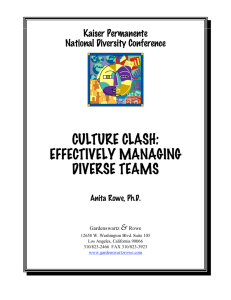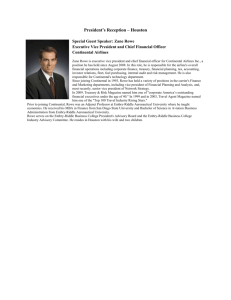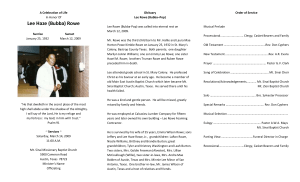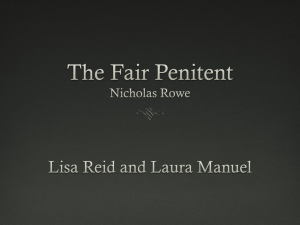REPLY TO ROWE Michael Bergmann & Daniel Howard-Snyder
advertisement
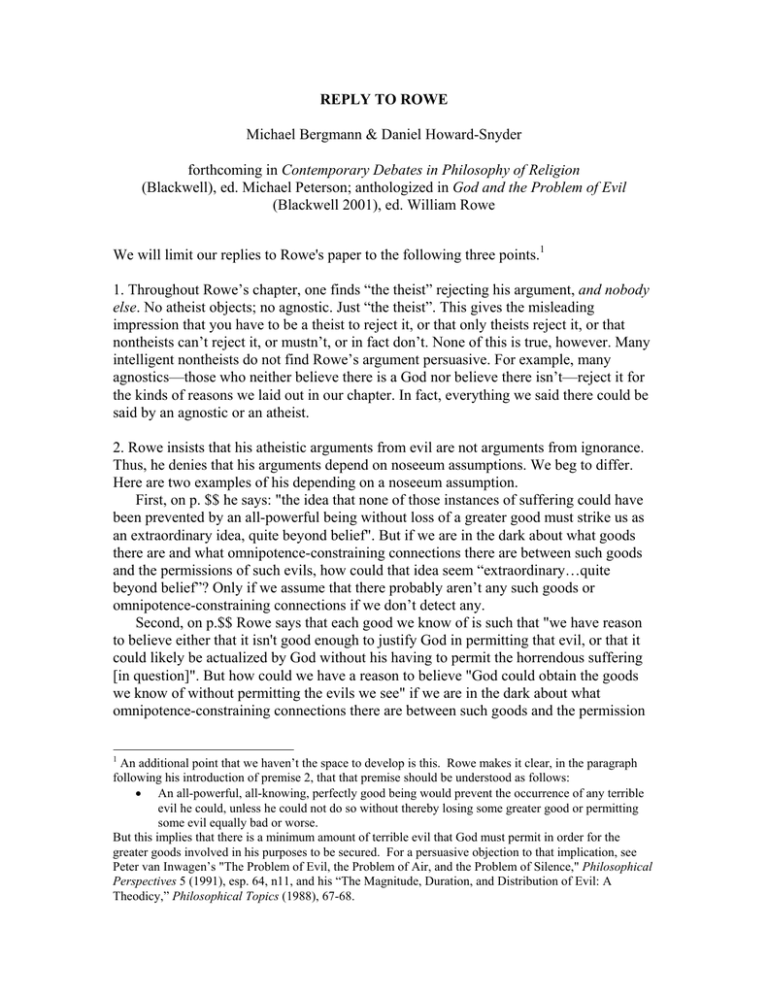
REPLY TO ROWE Michael Bergmann & Daniel Howard-Snyder forthcoming in Contemporary Debates in Philosophy of Religion (Blackwell), ed. Michael Peterson; anthologized in God and the Problem of Evil (Blackwell 2001), ed. William Rowe We will limit our replies to Rowe's paper to the following three points.1 1. Throughout Rowe’s chapter, one finds “the theist” rejecting his argument, and nobody else. No atheist objects; no agnostic. Just “the theist”. This gives the misleading impression that you have to be a theist to reject it, or that only theists reject it, or that nontheists can’t reject it, or mustn’t, or in fact don’t. None of this is true, however. Many intelligent nontheists do not find Rowe’s argument persuasive. For example, many agnostics—those who neither believe there is a God nor believe there isn’t—reject it for the kinds of reasons we laid out in our chapter. In fact, everything we said there could be said by an agnostic or an atheist. 2. Rowe insists that his atheistic arguments from evil are not arguments from ignorance. Thus, he denies that his arguments depend on noseeum assumptions. We beg to differ. Here are two examples of his depending on a noseeum assumption. First, on p. $$ he says: "the idea that none of those instances of suffering could have been prevented by an all-powerful being without loss of a greater good must strike us as an extraordinary idea, quite beyond belief". But if we are in the dark about what goods there are and what omnipotence-constraining connections there are between such goods and the permissions of such evils, how could that idea seem “extraordinary…quite beyond belief”? Only if we assume that there probably aren’t any such goods or omnipotence-constraining connections if we don’t detect any. Second, on p.$$ Rowe says that each good we know of is such that "we have reason to believe either that it isn't good enough to justify God in permitting that evil, or that it could likely be actualized by God without his having to permit the horrendous suffering [in question]". But how could we have a reason to believe "God could obtain the goods we know of without permitting the evils we see" if we are in the dark about what omnipotence-constraining connections there are between such goods and the permission 1 An additional point that we haven’t the space to develop is this. Rowe makes it clear, in the paragraph following his introduction of premise 2, that that premise should be understood as follows: • An all-powerful, all-knowing, perfectly good being would prevent the occurrence of any terrible evil he could, unless he could not do so without thereby losing some greater good or permitting some evil equally bad or worse. But this implies that there is a minimum amount of terrible evil that God must permit in order for the greater goods involved in his purposes to be secured. For a persuasive objection to that implication, see Peter van Inwagen’s "The Problem of Evil, the Problem of Air, and the Problem of Silence," Philosophical Perspectives 5 (1991), esp. 64, n11, and his “The Magnitude, Duration, and Distribution of Evil: A Theodicy,” Philosophical Topics (1988), 67-68. of such evils? Here too Rowe seems to be assuming that there probably are no such connections if we don’t detect any. 3. On p. $$, Rowe considers one last attempt to defend what he calls 'the first response' to his argument from evil. In his reply to this last attempt, he uses the example of Smith and the concert. Let T signify "Smith is in town this evening" and let C signify "Smith is at the concert this evening". We can then state Rowe's example as follows: • Pr(T/k) = 0.5 • Pr(not-T/k) = 0.5 • Pr(C/T&k) = 0.5 • Pr(not-C/T&k) = 0.5.2 He sensibly concludes that if we know these things and then learn that not-C, we may conclude that T is less likely than not-T. So far, so good.3 Next, Rowe tries to draw the parallel with the case of theism and evil. Let G signify "God exists" and let A signify "Some good we know of justifies God in permitting all the horrendous evils we see". We can, says Rowe, state the parallel case like this: • Pr(G/k) = 0.5 • Pr(not-G/k) = 0.5 • Pr(A/G&k) = 0.5 • Pr(not-A/G&k) = 0.5 Again, he sensibly concludes that if we know these things and then learn that not-A we may conclude that G is less likely than not-G.4 What we’ve been given here is an easily digestible version of Rowe’s new Bayesian argument from evil, the one we discussed in section 4 of our chapter. Our response is essentially the same as the response we gave there. The first thing to notice is that Rowe’s argument about Smith’s whereabouts could not get off the ground unless Pr(not-C/T&k) is not high. For if it is extremely high, then not-C will not significantly lower the likelihood of T. (If Pr(not-C/T&k) is as high as 1, not-C won't lower the likelihood of T at all!) In other words, if not-C is just what you would expect if T were true, then learning not-C won't make T less likely than it would otherwise be. For similar reasons, Rowe's parallel argument about God and evil doesn’t have a chance unless Pr(not-A/G&k) is not high. Rowe tries to avoid this problem by simply asserting that this latter probability is equal to 0.5. But why think that? In fact, why think Pr(not-A/G&k) isn't extremely high, perhaps as high as 1? These questions will be familiar to those who have read our chapter. For not-A (i.e., no good we know of justifies God in permitting all the horrendous evils we see) is a lot like P from our paper (i.e., no good we know of justifies God in permitting E1 and E2). And just as we are in no position to tell that Pr(P/G&k) is high or that it is low or that it is middling, so also we are in no position to tell that Pr(not-A/G&k) is high or that it is low or that it is middling. 2 On p. $$ of our chapter we explain our use of the symbol 'k' and the notation 'Pr(x/y)'. The idea here seems to be that since not-T entails not-C, we know that Pr(not-C/not-T&k) = 1 and that Pr(C/not-T&k) = 0. So we know that Pr(not-C/not-T&k) > Pr(not-C/T&k). This, I take it, is why Rowe concludes that learning not-C makes T less likely than not-T. 4 Rowe is assuming that just as not-T entails not-C, so also not-G entails not-A. 3 Rowe's argument simply takes for granted that we are in a position to assign a value of 0.5 here when in fact we are in the dark about what probability to assign.


